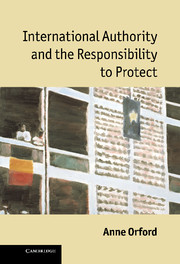Book contents
- Frontmatter
- Contents
- Acknowledgements
- 1 Protection in the Shadow of Empire
- 2 Practices of Protection: From the Parliament of Man to International Executive Rule
- 3 How to Recognise Lawful Authority: Hobbes, Schmitt and the Responsibility to Protect
- 4 Who Decides? Who Interprets?: Jurisdiction, Recognition and the Institutionalisation of Protection
- 5 The Question of Status and the Subject of Protection
- Bibliography
- Index
4 - Who Decides? Who Interprets?: Jurisdiction, Recognition and the Institutionalisation of Protection
Published online by Cambridge University Press: 04 February 2011
- Frontmatter
- Contents
- Acknowledgements
- 1 Protection in the Shadow of Empire
- 2 Practices of Protection: From the Parliament of Man to International Executive Rule
- 3 How to Recognise Lawful Authority: Hobbes, Schmitt and the Responsibility to Protect
- 4 Who Decides? Who Interprets?: Jurisdiction, Recognition and the Institutionalisation of Protection
- 5 The Question of Status and the Subject of Protection
- Bibliography
- Index
Summary
Until the Day of Judgement, the Augustinian teaching on the two kingdoms will have to face the twofold open question: Quis judicabit? Quis interpretabitur? [‘Who will decide? Who will interpret?’] Who answers in concreto, on behalf of the concrete, autonomously acting human being, the question of what is spiritual, what is worldly and what is the case with the res mixtae.
Thomas Hobbes taught that in a fractured world, where tradition, shared values or a common God no longer guaranteed meaning, the lawfulness of authority could only be grounded upon the capacity to protect. Yet the turn to protection as the basis of authority raised a new question: who decides? Who decides what protection means and which claimant to authority can guarantee it? Who decides whether a particular government is in fact capable of protecting its population and bringing peace to its territory? Who has the authority to judge the legitimacy of rulers? Who speaks for peace in a particular time and place?
Those questions were central to the project of establishing and consolidating the authority of the modern state. When Hobbes argued that the lawfulness of authority was grounded upon the capacity to protect, he was playing a part in a much broader struggle between church and state, or spiritual and temporal authority. Central to that struggle was the question of whether the Pope had jurisdiction to declare that a ruler was unlawful and should be deposed or resisted.
- Type
- Chapter
- Information
- International Authority and the Responsibility to Protect , pp. 139 - 188Publisher: Cambridge University PressPrint publication year: 2011



